Teacher of the Year awards represent the highest honor educational institutions can bestow upon their educators, recognizing outstanding teaching excellence, dedication to student success, and exceptional contributions to school communities. When schools systematically celebrate these award recipients through visible, engaging showcase programs, they honor individual excellence while inspiring all educators and demonstrating institutional commitment to recognizing the professionals who shape student lives.
Yet many schools struggle to give Teacher of the Year awards the prominence and lasting visibility they deserve. Recognition often defaults to brief ceremony acknowledgments that fade quickly, certificates filed away in personal collections, or static bulletin board announcements that become outdated and overlooked. Meanwhile, the significant accomplishments that earned these prestigious designations—years of excellence, innovative teaching, student relationship building, and community contribution—receive less lasting visibility than they warrant.
This comprehensive guide explores evidence-based strategies for implementing Teacher of the Year award showcase programs that celebrate educational excellence through permanent recognition displays, engaging ceremonies, and systematic appreciation approaches that honor award recipients while inspiring entire teaching communities toward excellence.
Effective Teacher of the Year recognition extends beyond ceremony moments—it creates lasting showcase systems that preserve award winner legacies, inspire current educators, and demonstrate institutional values through visible celebration of teaching excellence. Schools that excel at showcasing Teacher of the Year recipients create environments where educational achievement receives recognition proportional to its profound impact on students and communities.
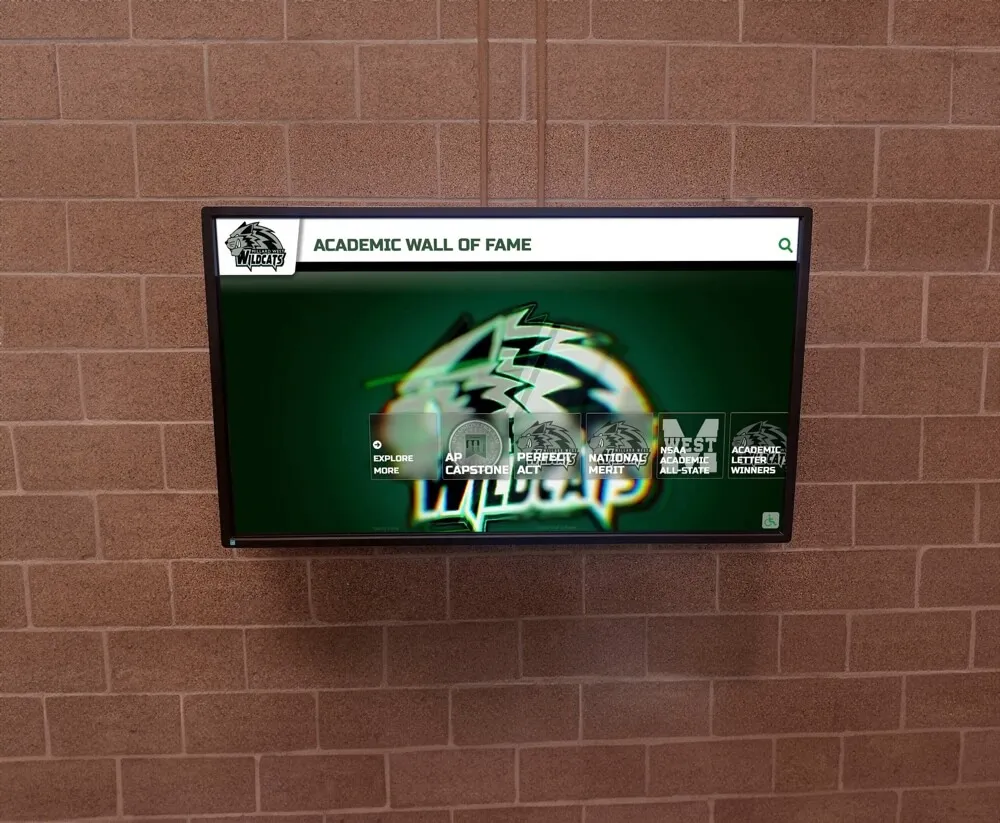
Modern recognition displays make Teacher of the Year achievements visible and celebrated throughout school communities
Understanding Teacher of the Year Award Programs
Before implementing showcase programs, schools must understand the various Teacher of the Year designations and their significance across different levels.
National Teacher of the Year Program
The Council of Chief State School Officers (CCSSO) administers the National Teacher of the Year program, representing the most prestigious teaching recognition in the United States.
Program Structure and Selection
According to the CCSSO National Teacher of the Year program, each state and territory selects one State Teacher of the Year through rigorous processes. From these state winners, a Selection Committee identifies four finalists who participate in interviews, school visits, and assessments. The National Teacher of the Year receives recognition from the President and serves as a national spokesperson for the teaching profession.
2025 Program Highlights
The 2025 program features Google for Education as the lead sponsor, providing enhanced visibility and resources. The four finalists represent diverse teaching contexts, grade levels, and subject areas, demonstrating excellence across the full spectrum of educational settings.
Award Components
National Teacher of the Year recipients receive national recognition from the President and educational leaders, year-long ambassadorial role representing the profession, speaking engagements and professional development opportunities, connections with educational policy makers and leaders, and lasting recognition as part of teaching excellence history.
Schools whose educators achieve state or national Teacher of the Year status should create comprehensive showcase programs that honor these extraordinary achievements while inspiring colleagues.
State Teacher of the Year Programs
Every state operates Teacher of the Year recognition programs with established selection processes and criteria.
Typical State Program Components
State programs generally include nomination processes accepting submissions from administrators, colleagues, students, or families; application requirements including teaching philosophy statements, evidence of impact, and professional contributions; finalist selection identifying top candidates for further review; site visits and interviews evaluating finalists in their teaching contexts; and final selection announced at state education conferences or special ceremonies.
State Program Variations
While structures vary, common elements include minimum years of teaching experience requirements, full-time teaching status expectations, demonstrated instructional excellence and innovation, leadership contributions beyond the classroom, and community engagement and family partnership.
Schools should actively participate in state Teacher of the Year programs by nominating qualified educators, supporting nominees through application processes, and prominently celebrating state Teacher of the Year designations when earned.
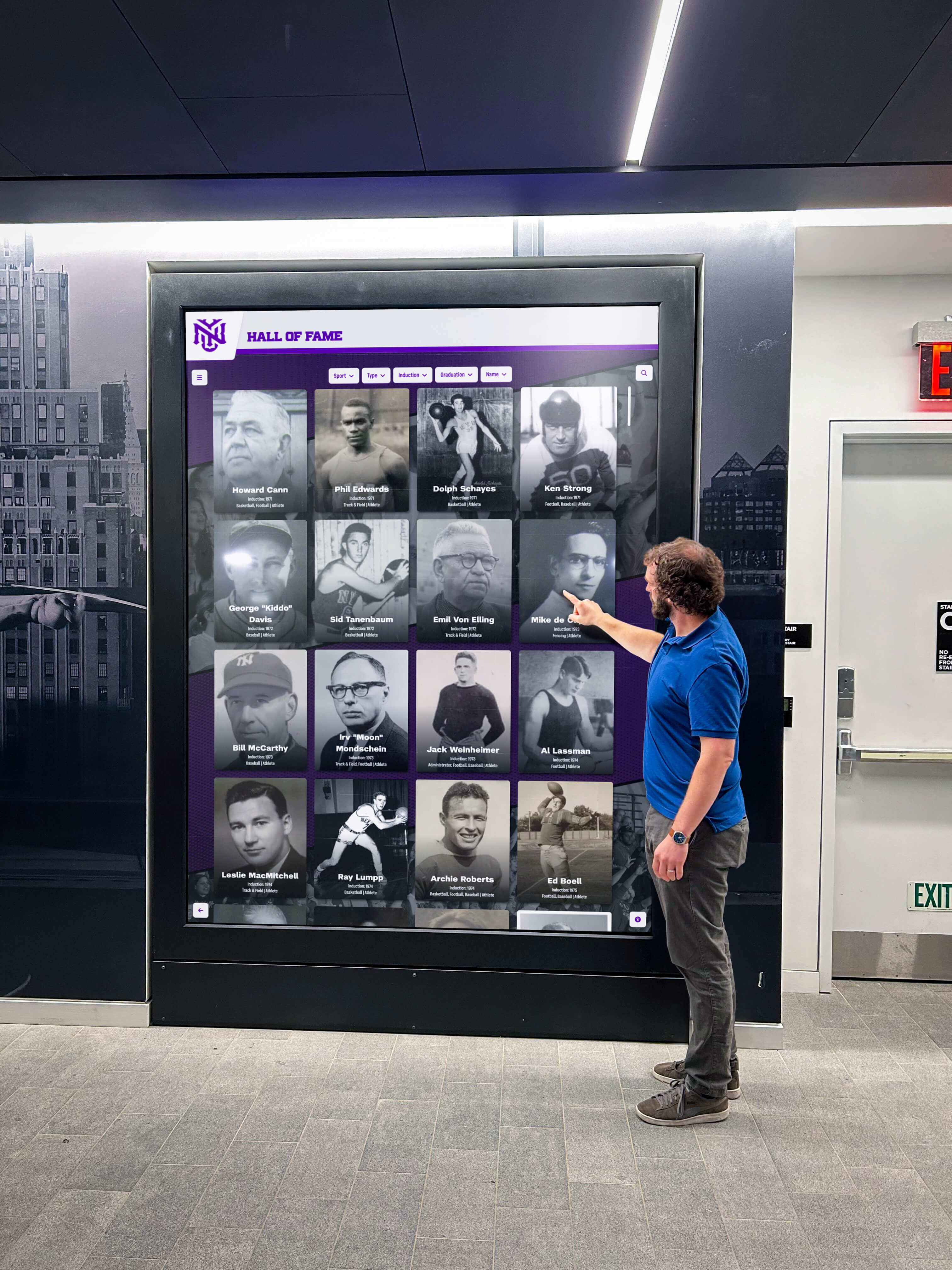
Interactive displays enable families and community members to explore Teacher of the Year achievements and stories
District and School-Level Teacher of the Year Awards
Most educational institutions implement local Teacher of the Year programs recognizing excellence within their communities.
District-Level Programs
Districts commonly select Teacher of the Year recipients from each school, creating district-level recognition that provides pathway to state nominations. District programs often include multiple recognition categories addressing different grade levels or specializations, celebration at district recognition events or board meetings, district-wide communication about award recipients, and consideration for state Teacher of the Year nomination.
School-Level Recognition
Individual schools typically conduct annual Teacher of the Year selection through nomination processes involving multiple stakeholders, selection committees representing administrators, teachers, and sometimes students or families, specific criteria aligned with school values and priorities, ceremony recognition during staff meetings or community events, and permanent recognition through displays or ongoing communication.
Learn more about comprehensive teacher and staff recognition programs that celebrate educational excellence systematically.
Creating Effective Teacher of the Year Selection Processes
Fair, transparent selection processes ensure Teacher of the Year awards maintain credibility and meaningful recognition value.
Establishing Clear Selection Criteria
Well-defined criteria help nominators, candidates, and selection committees understand what excellence looks like in your context.
Core Evaluation Categories
Effective Teacher of the Year criteria typically encompass instructional excellence and innovation in teaching methods, measurable student achievement and growth, positive classroom culture and student relationships, professional contributions beyond the classroom, leadership and mentorship of colleagues, family and community engagement, and demonstration of institutional values and mission.
Balancing Quantitative and Qualitative Evidence
Strong selection processes require both measurable outcomes—test score growth, attendance rates, course completion—and qualitative evidence including teaching observations, colleague testimonials, student feedback, family perspectives, and professional contribution documentation.
Inclusive Criteria Design
Ensure criteria recognize diverse excellence by acknowledging various subject areas and specializations equally, valuing different grade level challenges appropriately, recognizing special education and support roles, honoring non-instructional staff contributions when appropriate, and avoiding criteria that inadvertently favor certain teaching contexts over others.
Nomination and Application Processes
Multiple Nomination Pathways
Accept nominations from administrators submitting formal recommendations, peer teachers recognizing colleague excellence, students sharing educator impact perspectives, families nominating teachers who changed their children’s lives, and self-nomination allowing educators to present their accomplishments.
Application Requirements
Request comprehensive documentation including teaching philosophy statements, evidence of student achievement and growth, documentation of professional contributions, letters of support from multiple sources, video demonstration of teaching practice when feasible, and reflection on challenges overcome and lessons learned.
Selection Committee Composition
Representative Membership
Effective committees include administrative leadership providing institutional perspective, peer teachers representing instructional excellence, department or grade-level diversity ensuring balanced representation, parent or community members adding external perspective, and previous Teacher of the Year recipients when available.
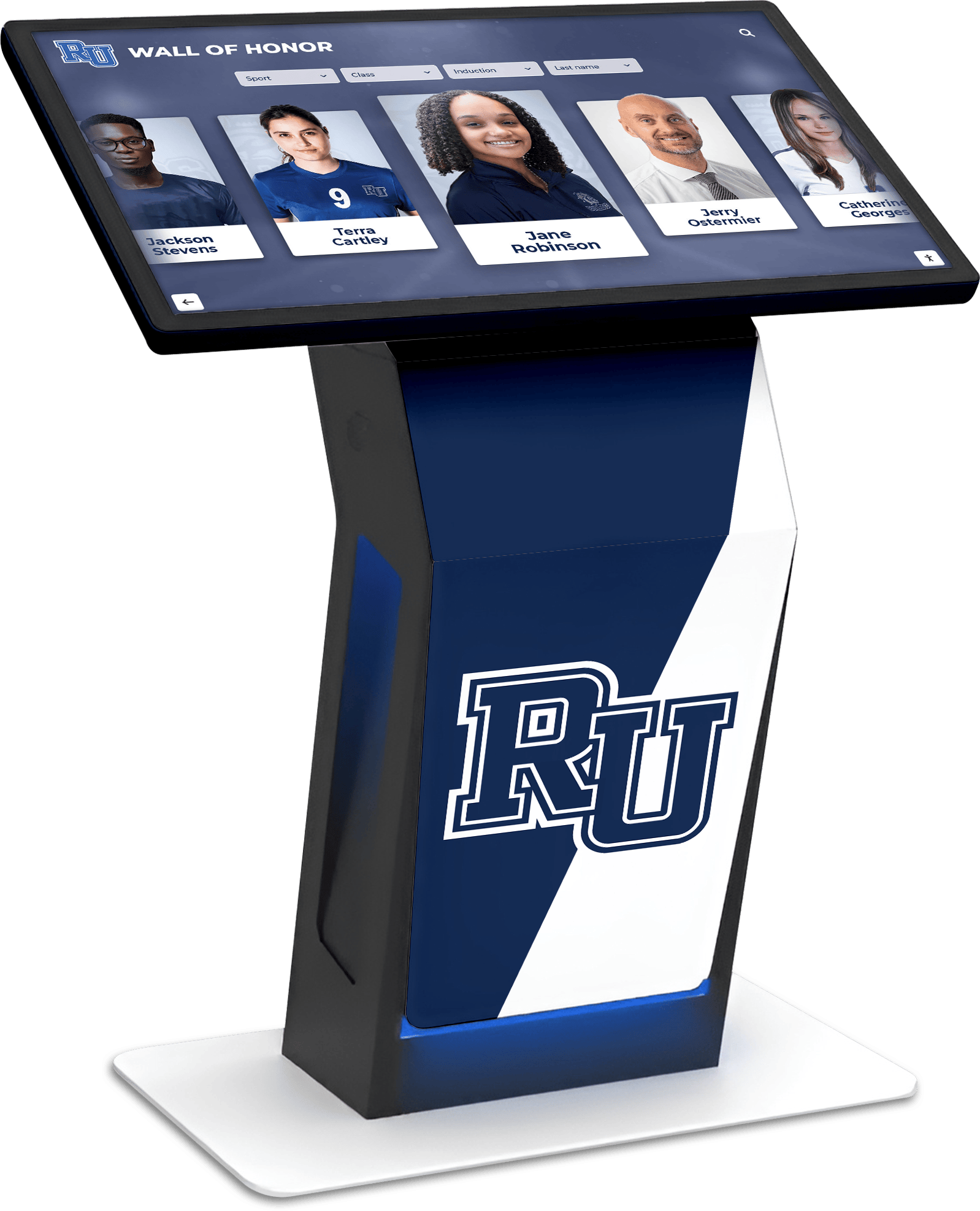
Interactive kiosks provide engaging platforms for exploring comprehensive educator profiles and achievements
Committee Training and Calibration
Prepare selection committees through rubric training ensuring consistent evaluation, bias awareness addressing potential favoritism or blind spots, confidentiality guidelines protecting candidate privacy, consensus-building processes for final decisions, and documentation requirements supporting transparent outcomes.
Explore comprehensive approaches to teaching awards and recognition programs that ensure fair, meaningful selection.
Teacher of the Year Recognition Ceremonies
Formal ceremonies create memorable recognition experiences that honor recipients while celebrating teaching excellence broadly.
Ceremony Planning and Design
Timing and Setting Considerations
Schedule ceremonies during staff professional development days ensuring full faculty attendance, evening events enabling family and community participation, back-to-school gatherings creating positive year-opening tone, spring recognition events celebrating year-end achievements, or integrated into existing recognition programs like honors nights.
Venue Selection
Choose locations that support school auditoriums accommodating entire communities, elegant off-campus venues for special significance, meaningful spaces on campus with special relevance, outdoor settings for appropriate seasons and contexts, or virtual/hybrid options ensuring accessibility when needed.
Program Structure
Effective ceremonies include opening remarks establishing importance and context, presentation of award recipient accomplishments and impact, speeches from Teacher of the Year honorees sharing their perspectives, testimonials from students, families, or colleagues, presentation of award certificates, plaques, or gifts, and closing celebration with reception and community mingling.
Making Ceremonies Memorable and Meaningful
Personal Recognition Elements
Create impact through video tributes featuring students and colleagues, surprise appearances by former students or special guests, reading of nomination letters or testimonials, photo or achievement displays showcasing the honoree’s career, and personal gifts reflecting individual interests or contributions.
Student Involvement
Engage students meaningfully by having them present flowers or small gifts to honorees, perform musical or dramatic tributes, share testimonials about teacher impact, create visual artwork or displays honoring recipients, and participate in ceremony planning committees.
Media and Communication
Extend ceremony impact through professional photography and videography documenting events, live streaming for broader community access, social media coverage with appropriate hashtags and tagging, press releases to local media outlets, and school website features and newsletter coverage.
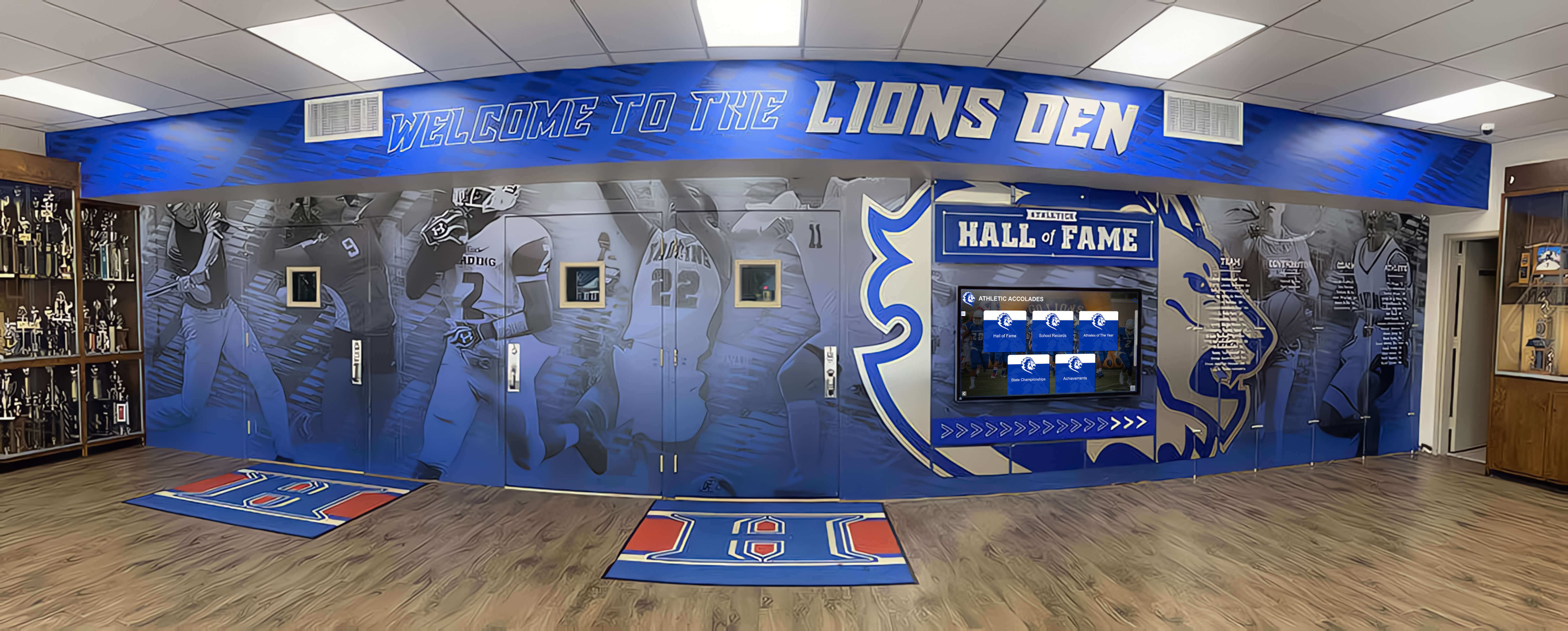
Multi-element recognition spaces combine ceremony acknowledgments with permanent display installations
Beyond the Ceremony: Ongoing Recognition
Year-Long Visibility
Teacher of the Year recognition should extend throughout winners’ designation year through reserved parking spots or special designations, featured profiles in monthly communications, leadership opportunities representing the school, professional development or conference attendance support, and mentorship roles with early-career teachers.
Permanent Recognition
Create lasting acknowledgment through addition to permanent Teacher of the Year displays, inclusion in school history and archival records, profiles on school websites and communications, integration into new teacher orientation as exemplars, and consideration for future leadership opportunities.
Learn about homecoming awards and school celebration events that can incorporate Teacher of the Year recognition.
Creating Permanent Teacher of the Year Showcases
Beyond ceremony moments, permanent displays provide lasting visibility that honors past recipients while inspiring current educators.
Traditional Teacher of the Year Display Approaches
Schools have historically recognized award recipients through various physical installations.
Plaque Walls and Trophy Cases
Traditional recognition includes engraved plaques listing year and recipient name, photographic displays showing Teacher of the Year portraits, trophy or award object displays in secure cases, chronological arrangements showing program history, and placement in high-visibility locations like main entrances or administrative areas.
Limitations of Traditional Displays
Physical plaques face significant constraints including limited space restricting how many years can be displayed, high costs for engraving and installation, difficulty updating or correcting information once installed, minimal information beyond names and years, and accessibility challenges for those seeking specific details.
Digital Teacher of the Year Showcase Solutions
Modern digital recognition systems address traditional limitations while creating engaging, comprehensive showcase experiences.
Unlimited Recognition Capacity
Digital platforms accommodate every Teacher of the Year recipient across unlimited years, comprehensive profiles including photos, accomplishments, and stories, multiple award categories when programs recognize various designations, historical archives preserving institutional teaching excellence tradition, and no need to remove past recipients when adding new honorees.
Rich Multimedia Content
Digital showcases enable professional portrait photography and candid teaching images, video testimonials from students, colleagues, or families, detailed narrative profiles explaining selection rationale and impact, documentation of specific teaching innovations or accomplishments, and links to related content or news coverage.

Touchscreen interfaces make exploring Teacher of the Year achievements engaging and intuitive for all visitors
Interactive Exploration Features
Modern systems provide search functionality allowing visitors to find specific teachers, filtering by year, subject area, or school level, chronological browsing showing program evolution, related content connections to other school recognition, and engagement analytics showing how visitors interact with recognition.
Immediate Updates and Maintenance
Cloud-based digital systems enable instant additions when new awards are announced, easy corrections if information needs updating, scheduled publishing aligned with ceremony timing, remote management from any internet-connected device, and no physical reinstallation or engraving delays.
Learn about comprehensive digital recognition display solutions for permanent educator celebration.
Rocket Alumni Solutions for Teacher of the Year Showcases
Purpose-built recognition platforms like Rocket Alumni Solutions provide specialized capabilities designed specifically for celebrating educational excellence including Teacher of the Year programs.
Comprehensive Recognition Features
Solutions like Rocket Alumni Solutions offer intuitive content management requiring minimal technical expertise, consistent profile templates ensuring professional presentation, unlimited capacity for growing recognition programs, touchscreen interactivity creating engaging exploration experiences, web accessibility extending reach beyond campus, mobile-responsive design ensuring access from any device, and cloud-based management enabling updates from anywhere.
Integration with Broader Recognition
Teacher of the Year showcases work most effectively when integrated with comprehensive systems celebrating academic recognition programs, student achievement displays creating connections between teaching and learning, staff longevity and milestone recognition, and alumni recognition linking past and current excellence.
Cost-Effective Scalability
Digital platforms provide 80-90% cost reduction compared to traditional plaque systems over time, single display accommodating multiple recognition categories, easy expansion as programs grow or evolve, reduced maintenance compared to physical installations, and multi-year value as displays remain current indefinitely.
Discover how Rocket Alumni Solutions can transform Teacher of the Year recognition at your institution.
Teacher of the Year Award Categories and Specialized Recognition
Comprehensive programs recognize diverse teaching excellence through multiple award categories.
Grade-Level and Department Recognition
Elementary Teacher of the Year
Recognize excellence in primary education through early literacy and foundational skill instruction, classroom management with young learners, social-emotional learning emphasis, family partnership and communication, and building student confidence and love of learning.
Middle School Teacher of the Year
Celebrate educators excelling with adolescents through developmental responsiveness to early adolescent needs, subject-matter instruction during transitional years, positive relationship building during challenging developmental period, team teaching and interdisciplinary approaches, and guidance supporting student identity formation.
High School Teacher of the Year
Honor secondary educators demonstrating rigorous college and career preparation instruction, mentorship during critical decision-making years, support for diverse learning needs and goals, content expertise and passion for subject matter, and preparation for post-secondary success.
Subject-Specific Recognition
STEM Teacher of the Year
Recognize excellence in science, technology, engineering, and mathematics through innovative STEM instruction and hands-on learning, integration of real-world applications, encouragement of problem-solving and critical thinking, support for underrepresented students in STEM fields, and preparation for STEM careers and further study.
Humanities Teacher of the Year
Celebrate educators excelling in language arts, social studies, and humanities through literacy development and love of reading, critical analysis and communication skills, historical thinking and cultural understanding, creative expression and artistic development, and preparation for informed citizenship.
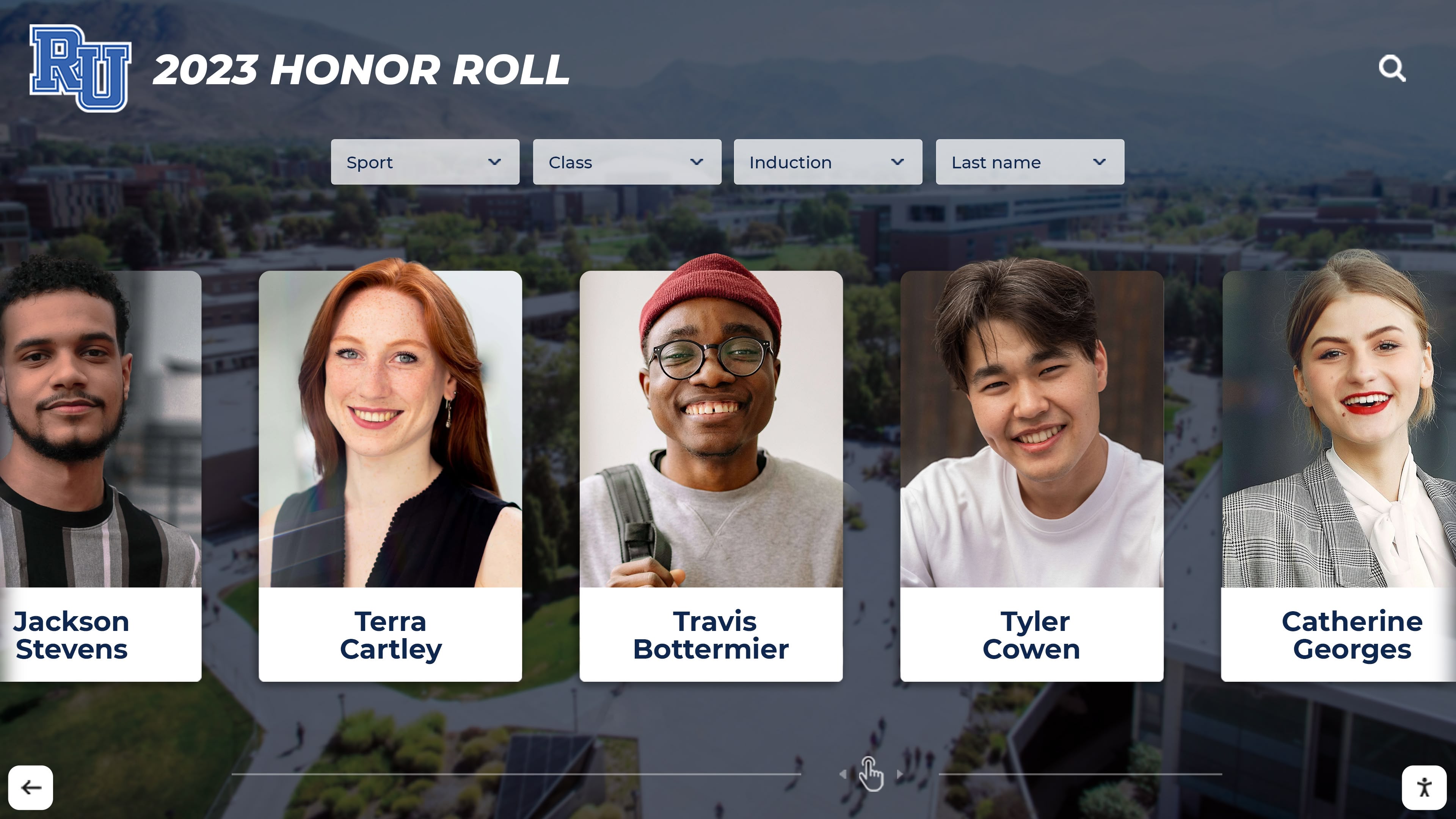
Individual recognition profiles celebrate specific teaching accomplishments and professional journeys
World Language and Arts Teacher of the Year
Honor specialists developing crucial competencies including multilingual communication skills, cultural competency and global awareness, artistic expression and creativity, performance and presentation skills, and appreciation for diverse perspectives and traditions.
Specialized Role Recognition
Special Education Teacher of the Year
Recognize exceptional educators serving students with diverse needs through individualized instruction and accommodation, advocacy for student rights and needs, collaboration with families and support teams, inclusive practice and least restrictive environment emphasis, and celebration of diverse abilities and learning differences.
Support Staff Educator of the Year
Honor professionals in non-classroom teaching roles including counselors supporting social-emotional and academic guidance, librarians fostering information literacy and love of reading, instructional coaches mentoring and developing colleagues, technology specialists enabling digital learning, and paraprofessionals providing essential instructional support.
Learn about academic recognition programs that complement teaching excellence celebration.
Communicating Teacher of the Year Recognition
Systematic communication amplifies recognition impact while inspiring broader communities.
Internal School Communication
Staff Announcements and Celebrations
Communicate Teacher of the Year recognition through faculty meeting announcements and celebrations, dedicated email communications to all staff, bulletin board displays in staff areas, integration into professional development sessions, and informal celebrations during planning periods.
Student Awareness and Engagement
Ensure students understand the recognition through morning announcements highlighting Teacher of the Year, classroom visits from administrators celebrating honorees, student-created congratulatory displays and messages, school newspaper or media coverage, and integration into relevant lessons about excellence and recognition.
External Community Communication
Family and Community Outreach
Share recognition broadly through school newsletter features with detailed profiles, social media posts celebrating achievements, website homepage features and dedicated pages, email communications to full school community, and press releases to local media outlets.
Media Coverage Strategy
Maximize visibility through professional press releases with compelling narratives, media advisory for ceremony attendance, photo opportunities and visual assets for coverage, interview coordination with Teacher of the Year honorees, and follow-up with community newspapers and local television.
Social Media Amplification
Leverage digital platforms for extended reach through Facebook posts with photos and achievement details, Twitter/X threads highlighting teacher impact stories, Instagram visual content celebrating recognition, LinkedIn professional accomplishment sharing, and appropriate hashtags like #TeacherOfTheYear and school-specific tags.
Alumni and Broader Network Communication
Alumni Engagement
Connect past students with current recognition through alumni newsletter features about Teacher of the Year, social media tagging of relevant alumni communities, invitation to recognition ceremonies when appropriate, collection of alumni testimonials about award recipients, and integration into alumni engagement programming.
Professional Network Sharing
Extend recognition to wider education communities through state education association communications, professional organization announcements, educational conference presentations when opportunities arise, peer district sharing of recognition approaches, and contribution to teaching excellence conversations.
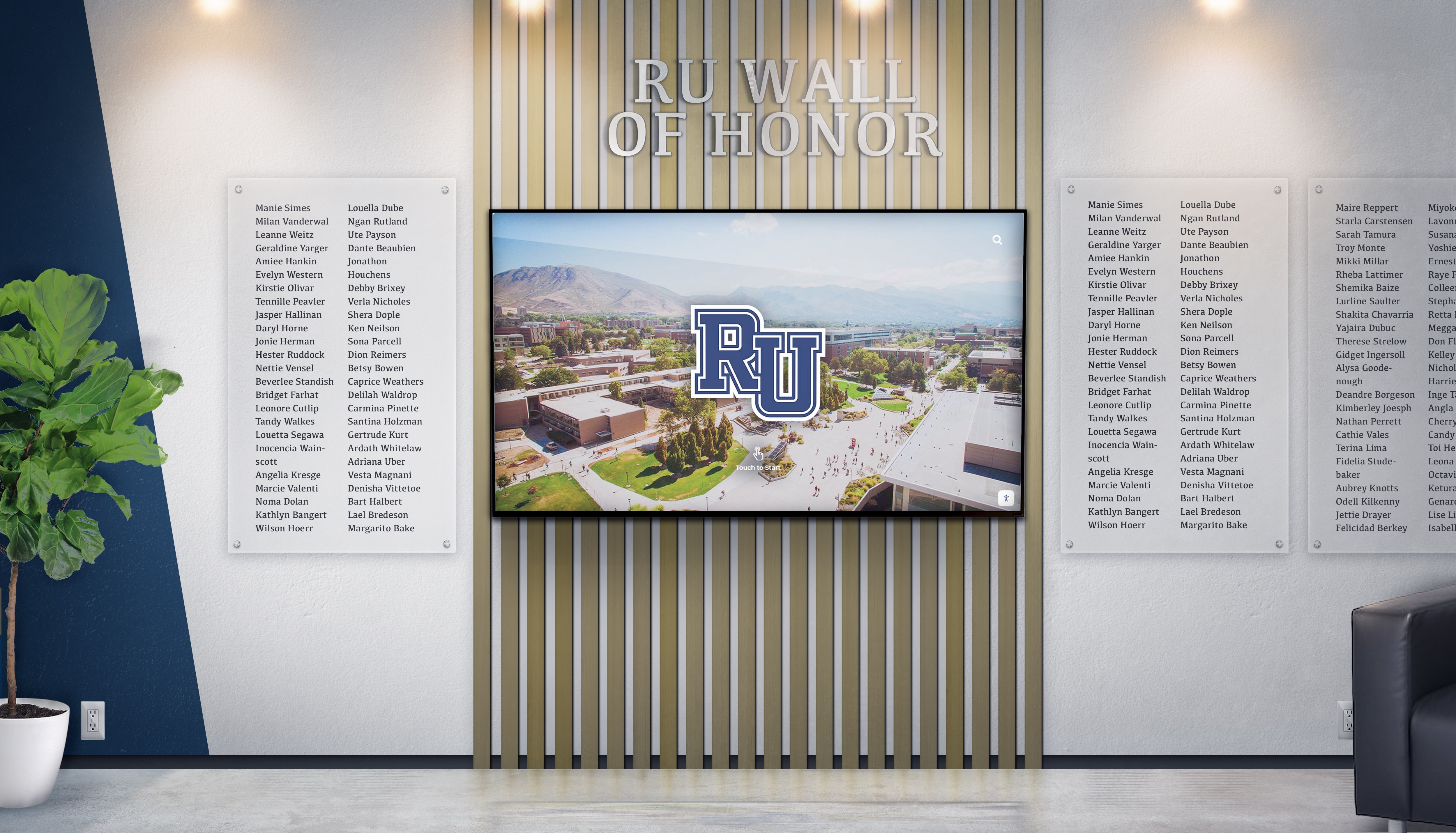
Integrated recognition systems combine digital displays with traditional elements for comprehensive Teacher of the Year celebration
Supporting Teacher of the Year Recipients Beyond Recognition
Award recipients deserve ongoing support that honors their designation while leveraging their excellence.
Professional Development Opportunities
Conference and Workshop Support
Enable professional growth through funding for national or state education conferences, registration for specialized professional development, travel support to learning opportunities, substitute coverage facilitating attendance, and networking connections with other award recipients.
Leadership Development
Prepare award recipients for expanded roles through administrative leadership program participation when interested, mentorship training supporting early-career teachers, curriculum development leadership opportunities, professional learning community facilitation, and presentation opportunities at staff development.
Teaching Practice Showcase
Demonstration Classroom Opportunities
Leverage Teacher of the Year expertise through observation opportunities for early-career teachers, video documentation of effective practices, hosting pre-service teacher field experiences, demonstration lessons for professional development, and coaching partnerships with teachers seeking growth.
Instructional Innovation Dissemination
Share effective practices beyond the award recipient’s classroom through professional publication of teaching innovations, conference presentation opportunities, district or state education department consultation, curriculum development leadership, and mentorship of teacher candidates or new educators.
Compensation and Benefits Recognition
Tangible Award Components
Complement recognition with appropriate benefits including monetary awards when budgets allow, tuition reimbursement for advanced degrees or coursework, classroom supply budgets or technology grants, travel stipends for professional conferences, and designated parking or other campus privileges.
Ongoing Appreciation
Maintain recognition throughout the award year through quarterly check-ins from administration, inclusion in school leadership meetings when appropriate, feature in recruitment materials and tours, priority consideration for desired assignments or schedules, and celebration at multiple school events throughout the year.
Learn about comprehensive teacher recognition programs that support award recipients effectively.
Building Culture of Excellence Through Teacher of the Year Programs
Well-designed programs create broader impact beyond individual recognition.
Inspiring Teaching Excellence School-Wide
Visible Excellence Standards
Teacher of the Year programs demonstrate institutional values through clear communication of what teaching excellence looks like, concrete examples through award recipient profiles, aspiration creation as educators see colleague recognition, professional development aligned with award criteria, and new teacher orientation featuring past recipients as exemplars.
Peer Learning and Mentorship
Award recipients serve the broader community through formal mentorship of early-career teachers, peer observation and coaching opportunities, professional learning community leadership, presentation at staff professional development, and informal consultation with colleagues.
Retention and Recruitment Benefits
Teacher Retention Impact
Recognition programs support retention through validation of excellent educators’ contributions, increased job satisfaction and professional pride, reduced likelihood of burnout or departure, strengthened connection to institutional mission and community, and demonstration that excellence receives appreciation.
Research from TNTP shows that explicit recognition and encouragement from school leaders significantly improve teacher retention rates, with retention jumping from 62% to 73% when moving from no strategies to just one recognition strategy.
Recruitment Advantage
Schools with strong recognition programs attract quality candidates through reputation for valuing and celebrating educators, visible commitment to professional excellence, demonstration of supportive leadership and culture, competitive positioning in teacher recruitment markets, and positive word-of-mouth from satisfied faculty.
Community Pride and Institutional Reputation
Demonstrating Educational Quality
Teacher of the Year recognition signals quality to stakeholders through visible celebration of teaching excellence, communication of high standards and expectations, evidence of effective teacher recruitment and retention, demonstration of leadership supporting professional growth, and community awareness of institutional commitment to education.
Building Community Support
Recognition programs strengthen broader support through family confidence in educational quality, community pride in local schools and educators, increased willingness to support school initiatives and funding, positive media coverage strengthening reputation, and partnership opportunities with businesses and organizations.
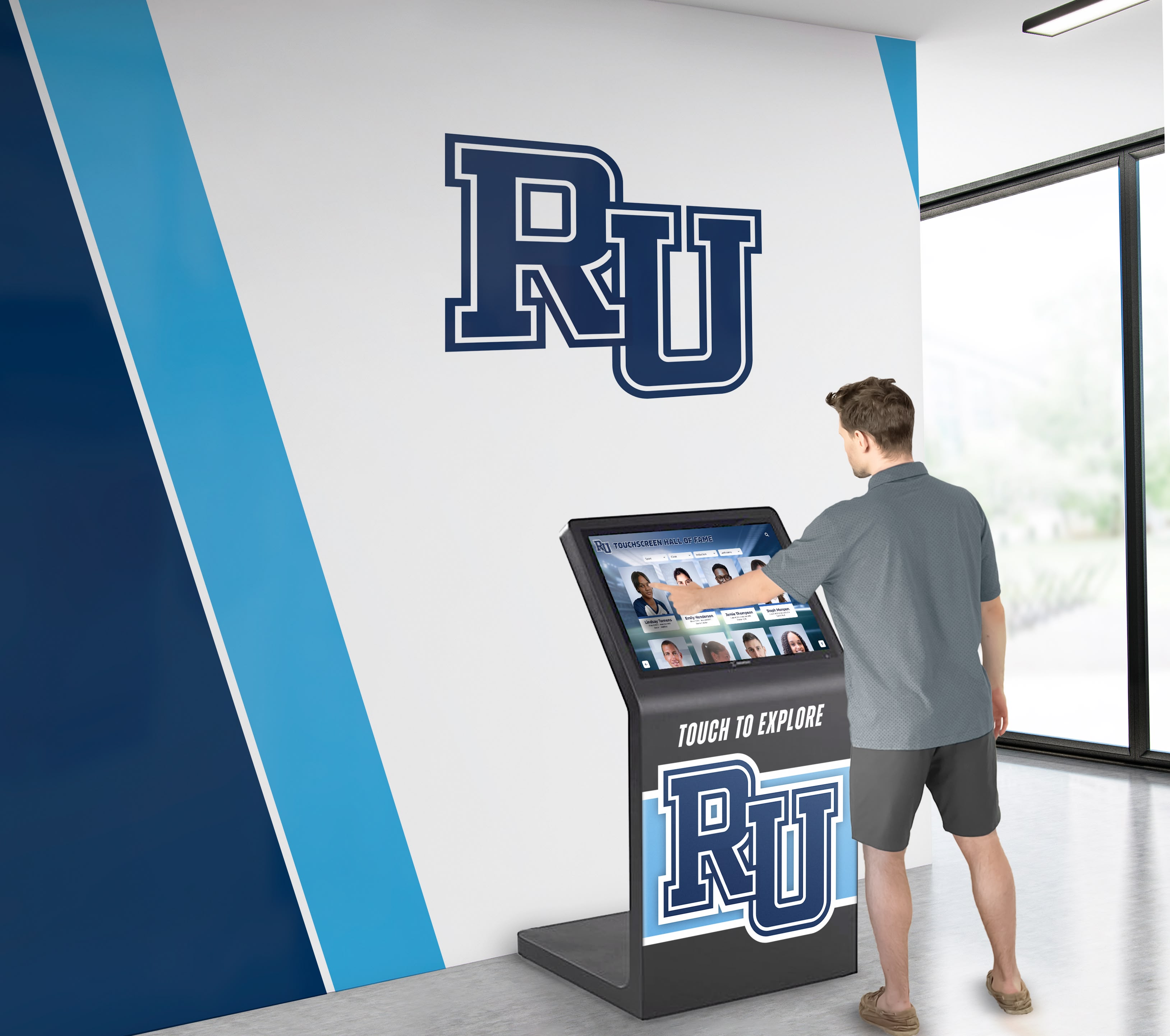
Strategic placement of recognition displays in high-traffic areas maximizes Teacher of the Year visibility and impact
Measuring Teacher of the Year Program Success
Regular assessment ensures programs achieve intended goals and justify resource investment.
Quantitative Success Indicators
Participation and Engagement Metrics
Track program health through nomination numbers year-over-year, diversity of nominees across departments and demographics, selection process participation rates, ceremony attendance figures, and digital showcase interaction analytics.
Impact on Institutional Goals
Measure broader outcomes including teacher retention rates among past recipients, comparison of retention for award participants vs. non-participants, recruitment applicant pool quality trends, staff satisfaction survey results on recognition climate, and professional development program participation.
Communication Reach
Assess visibility through social media engagement metrics on recognition content, media coverage quantity and quality, website traffic to Teacher of the Year pages, community event attendance, and parent awareness survey results.
Qualitative Assessment Approaches
Stakeholder Feedback
Gather perspectives through teacher surveys about program fairness and meaningfulness, award recipient interviews about recognition experience impact, administrator assessment of program effectiveness and sustainability, student and family feedback on teaching quality perceptions, and community stakeholder input on school culture.
Cultural Indicators
Observe program impact through staff morale and collegiality improvements, increased risk-taking and innovation in instruction, strengthened professional learning communities, enhanced new teacher integration and support, and positive changes in teaching excellence conversations.
Long-Term Career Trajectories
Monitor award recipient paths including leadership role progression over time, continued employment and commitment to institution, advanced degree pursuit and professional growth, mentorship of early-career teachers, and contributions to broader educational community.
Conclusion: Creating Lasting Impact Through Teacher of the Year Recognition
Effective Teacher of the Year award showcase programs represent strategic investments in educational excellence, teacher retention, and institutional culture. When schools systematically celebrate award recipients through visible recognition displays, engaging ceremonies, comprehensive communication, and ongoing support, they honor individual excellence while inspiring entire faculty communities toward teaching greatness.
The strategies explored in this guide provide comprehensive frameworks for building Teacher of the Year programs that create lasting impact. From fair selection processes ensuring meaningful awards to digital recognition platforms enabling permanent showcase displays to systematic communication amplifying recognition reach, these approaches transform Teacher of the Year acknowledgment from brief ceremony moments into sustained celebration woven throughout school culture.
Transform Your Teacher of the Year Recognition Program
Discover how modern digital recognition solutions can help you celebrate Teacher of the Year recipients with permanent, engaging displays that honor educational excellence and inspire your entire teaching community.
Explore Recognition SolutionsModern digital recognition platforms make comprehensive Teacher of the Year celebration achievable for schools of all sizes and resources. Purpose-built solutions like Rocket Alumni Solutions eliminate administrative burden while creating interactive experiences that engage students, families, and communities with teaching excellence stories. When Teacher of the Year achievements receive visibility through prominent digital displays combined with systematic communication and ongoing support, recognition influences not just those celebrated but all educators who encounter these displays while considering their own professional journeys.
Start where you are—whether implementing your first formal Teacher of the Year program or enhancing existing recognition—then systematically expand to create comprehensive approaches your educators deserve. Every Teacher of the Year recipient who receives prominent, lasting recognition develops deeper connection to your institution and greater commitment to sustained excellence, while every colleague who encounters that recognition gains inspiration and concrete understanding of valued teaching practices.
Your educators’ dedication to student success deserves celebration equal to their profound impact. With thoughtful planning, appropriate technology, and sustained implementation, you can create Teacher of the Year showcase programs that honor every recipient while building positive, motivating school culture where teaching excellence thrives and educators feel genuinely valued for their transformative work.
Ready to begin? Explore additional educator recognition strategies including comprehensive teaching awards programs, staff appreciation approaches, or learn about building culture through recognition that celebrates excellence across all dimensions.




































